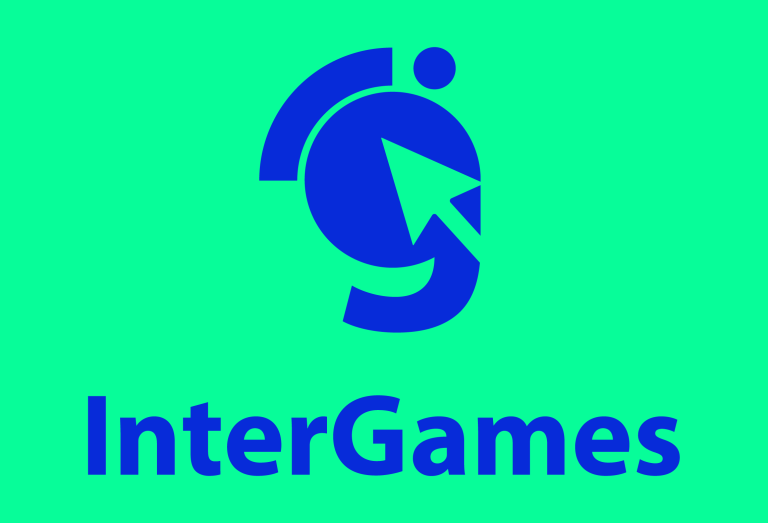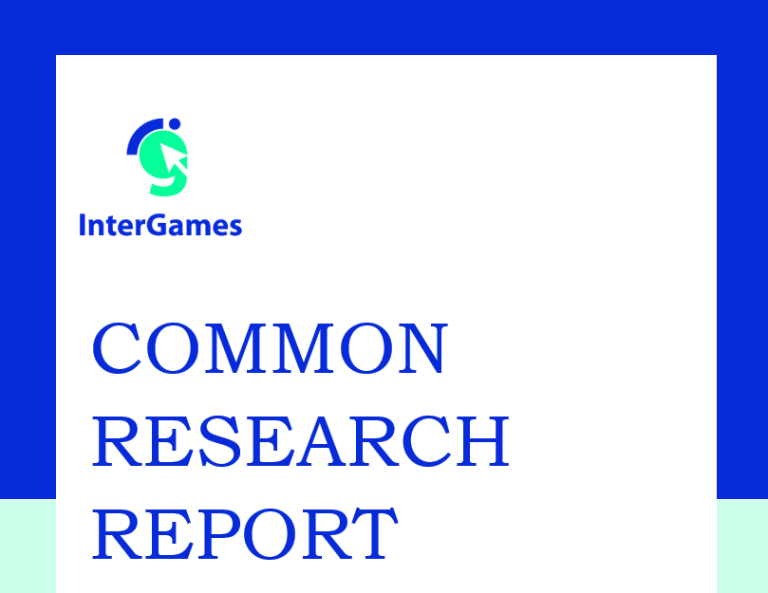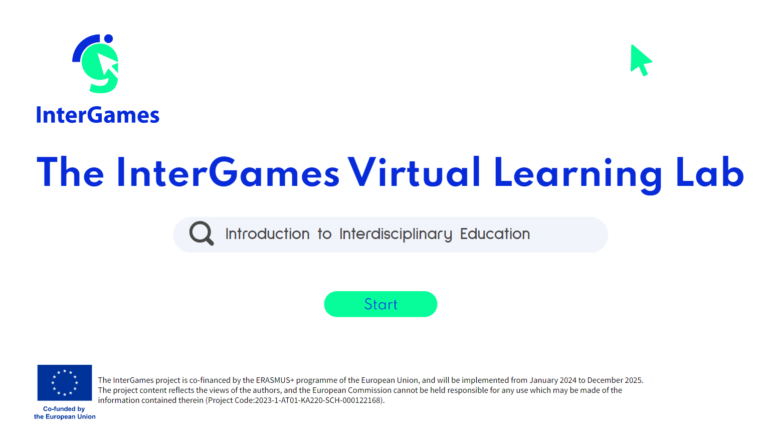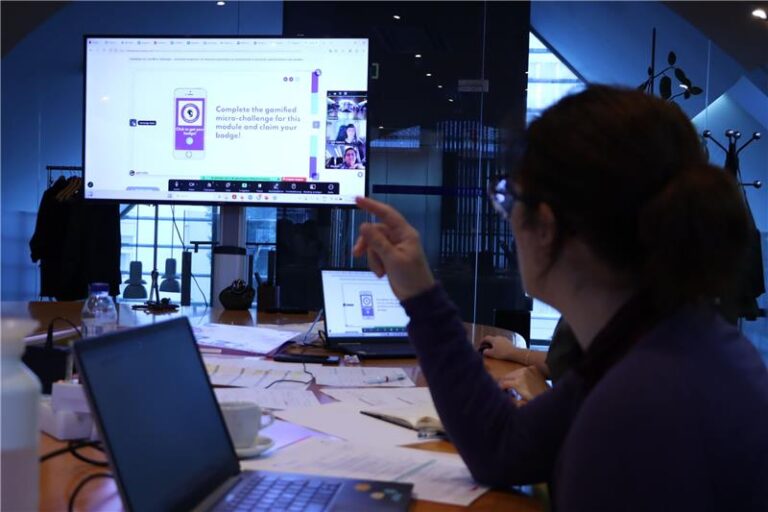
An introduction to the InterGames – Project
– Interdisciplinarity, Conflict and Video Games in Secondary Education
InterGames is a pioneering project aimed at enriching secondary school education through an innovative combination of interdisciplinary learning, conflict and video games.
The three important components of InterGames:
Why Interdisciplinarity?
In today’s complex world, education needs to empower learners to navigate their paths independently. Solutions to global challenges require diverse perspectives for individual and societal well-being. It’s crucial to focus not only on knowledge and skills, but also on the creation of effective learning environments, that strengthen competencies, like critical thinking and adaptability.[1]
Why Conflict?
We live in a time, in which nations, communities, and individuals face unprecedented challenges. Conflicts are escalating, affecting an increasing number of people. The proximity and frequency of conflict are changing, compared to previous decades, and young people are directly confronted with issues of war, conflict, and conflicting issues, such as environmental disputes in their daily lives.
Why Video Games?
Among 10-20 year-olds, video gaming remains a dominant form of entertainment and social interaction, particularly during the COVID-19 pandemic, where gaming served as a crucial outlet for connection and recreation. Post-pandemic, this age group continues to significantly engage in the gaming sector. Mobile gaming, in particular, remains highly favoured among this demographic.[2]
InterGames Project Goals
By integrating these three elements, InterGames seeks to equip students aged 14-16 with essential 21st-century skills such as critical thinking, problem-solving, and emotional intelligence to navigate challenges in their day-to day-live. Further, the following skills and aims are intended:
- Development of innovative educational and teaching methods for practical use for teachers and students
- Creation of a Virtual Learning Lab (VLL) as a main goal. It aims to provide training to educators on interdisciplinary teaching methods, and encourage students to apply interdisciplinary learning practically.
- Introduction of interdisciplinary educational approaches through conflict video games.
- Exploration of the digital transformation, European democracy and other European Union legislative Programs (f.e. the European Green Deal) through pedagogical instruments.
- Handling of challenging topics, like conflicts through the use of video games – by tapping into already existing skills and interests.
- Empowerment of teachers and students to navigate in contemporary society through the developed activities. They get equipped for the workforce, active citizenship and participation in their societal living-frame.
The Consortium – Meet the partners
In the InterGames Project, 7 European partners collaborate closely to achieve the mentioned goals. They represent a diverse mix of institutions with extensive expertise in global and sustainable learning, gaming, and education.
- Global Perspective on Education and Training from three NGOs
Citizens In Power (CIP) from Cyprus, Progettomondo from Italy, and Südwind from Austria are European NGOs united in their dedication to promote education, social engagement and global awareness. With a strong focus on international collaborations, training programs and campaigns, these organizations prioritize global education, intercultural dialogue, and human rights advocacy.
They bring on the table their expertise on global learning, diverse teaching methods, and engaging educational practices.
- Entrepreneurial knowledge and scientific expertise in gamification processes
Helixconnect Europe S.R.L. in Romania and the University of A Coruña (UDC) in Spain contribute entrepreneurial knowledge and scientific expertise in gamification processes, and a focus on smart industry and innovations. With their empirical and scientific experience, they enhance the findings of the project. UDC will further prepare a scientific report on the testing of the pedagogical sequences with students and the impact of interdisciplinary learning.
- Practical Skills and Teaching Experience from two school partners
Both Björkhöjdskolan in Sweden and BHAK/BHAS Linz International Business School in Austria offer education to students aged 13-16 and beyond. While Björkhöjdskolan focuses on providing education to students with different ethnic backgrounds, BHAK/BHAS Linz specializes in commercial subjects, including Marketing-Controlling, International Business, and Finance- and Riskmanagement.
Both schools will serve as practical implementers of the developed educational materials and act as pilot schools for the InterGames project. They will provide feedback and test the materials with the peer-groups.
You can find out more about all seven partners here. [Link: Partners – InterGames (intergames-project.com)].
Kick-Off in Cyprus – Project-Start and further actions
There was a project kick-off in Cyprus, in Nicosia, from January 2nd to February 29th 2024, where representatives of the 7 organizations gathered to discuss the project’s further progress, initial work packages, and objectives. The atmosphere was positive and motivated everyone to finally start the project and delve into the topics of interdisciplinarity and conflict video games. Among other things, discussions included which kind of conflicts to address in the interactive gamified tasks and which video games to select. The diversity of the organizations and their varied expertise were already evident and put to use. We are looking forward to explore the topic, gain knowledge in this specific field and learn from each other.
This Blog will be updated constantly to inform about the progress and new developments of the project’s activities. If you have any questions, feel free to get in touch through the contact form (Link: Contact Us – InterGames (intergames-project.com).
[1] OECD Future of Education and Skills 2030. (2019) OECD Learning Compass 2030 – A Series Of Concet Notes, https://www.oecd.org/education/2030-project /contact/OECD_Learning_Compass_2030_Concept_Note_Series.pdf
[2] https://www.statista.com/topics/1680/gaming/#topicOverview



